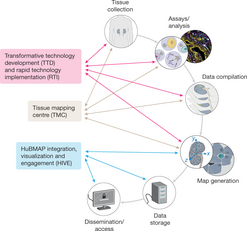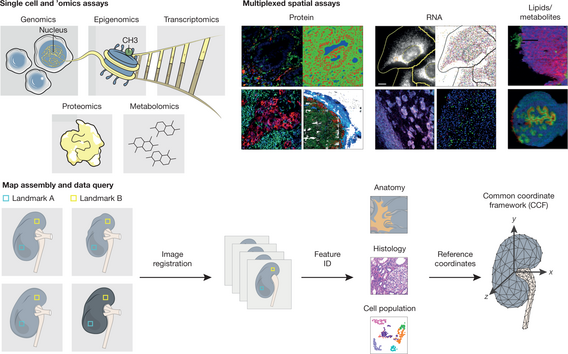The Human Biomolecular Atlas Program (HuBMAP) is a program funded by the US National Institutes of Health to characterize the human body at single cell resolution, integrated to other efforts such as the Human Cell Atlas.[1] Among the products of the program is the Azimuth reference datasets for single-cell RNA seq data [2][3] and the ASCT+B Reporter, a visualization tool for anatomical structures, cell types and biomarkers.[4][5]

Millitomes are used to create uniformly sized tissue blocks that match the shape and size of organs from HuBMAP's 3D Reference Object Library.[6]
The HuBMAP received 27 million US dollars of funding from the NIH in 2020 and about 28.5 million in 2021.[7]

References
edit- ^ a b c Snyder MP, Lin S, Posgai A, Atkinson M, Regev A, Rood J, et al. (HuBMAP Consortium) (October 2019). "The human body at cellular resolution: the NIH Human Biomolecular Atlas Program". Nature. 574 (7777): 187–192. Bibcode:2019Natur.574..187H. doi:10.1038/S41586-019-1629-X. PMC 6800388. PMID 31597973.
- ^ Hao Y, Hao S, Andersen-Nissen E, Mauck WM, Zheng S, Butler A, et al. (June 2021). "Integrated analysis of multimodal single-cell data". Cell. 184 (13): 3573–3587.e29. doi:10.1016/j.cell.2021.04.048. PMC 8238499. PMID 34062119.
- ^ "Azimuth". azimuth.hubmapconsortium.org. Archived from the original on 2022-07-06. Retrieved 2022-07-11.
- ^ "ASCT+B Reporter". ccf-asctb-reporter-v2.netlify.app. Retrieved 2022-07-11.[permanent dead link]
- ^ Boppana A, Lee S, Malhotra R, Halushka M, Quardokus EM, Herr BW, Börner K, Weber GM (2022-03-01). "Anatomical structures, cell types, and biomarkers of the healthy human blood vasculature". bioRxiv. doi:10.1101/2022.02.28.482302. S2CID 247231648.
- ^ HIVE MC-IU Team. "HuBMAP: CCF Portal". hubmapconsortium.github.io. Retrieved 2022-08-27.
- ^ "NIH Common Fund CONGRESSIONAL JUSTIFICATION FY 2022" (PDF). Archived (PDF) from the original on 2021-11-05. Retrieved 2022-07-11.
External links
edit- Official website
- "Human BioMolecular Atlas Program". Nature. 2023-07-19.